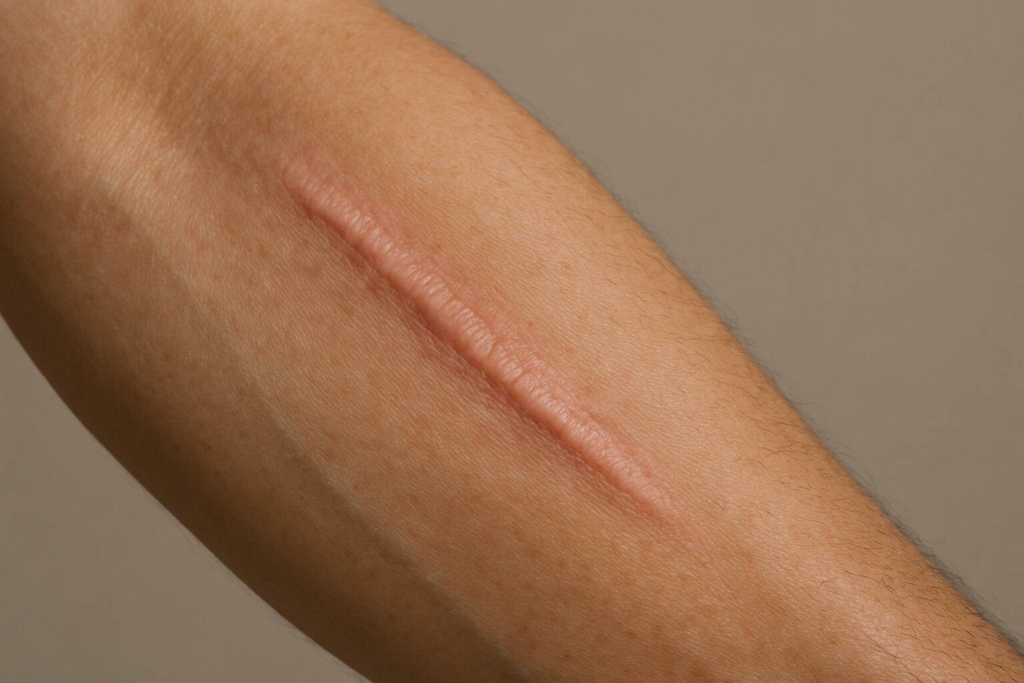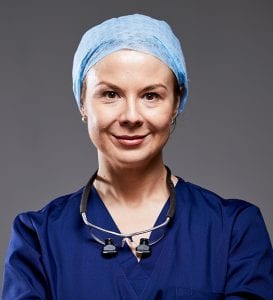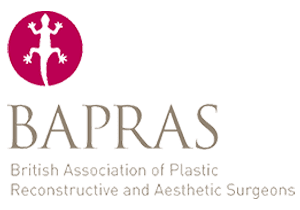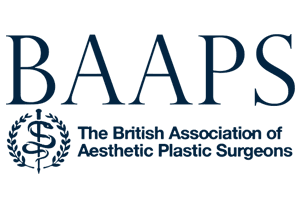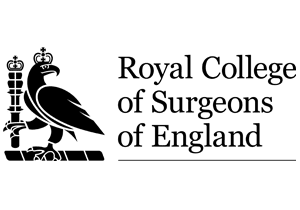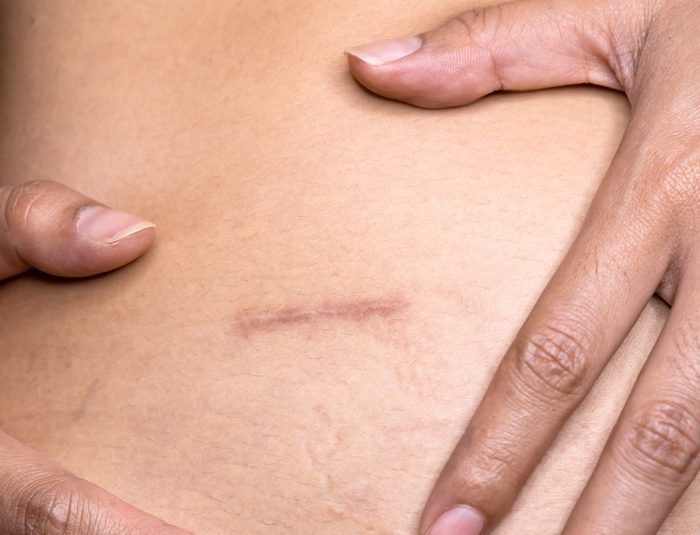
What Are Scars and Why Do They Form?
Scars are a natural part of the body’s healing process, forming as a result of injury, surgery, or conditions like acne. At Cheshire Cosmetic Surgery, our consultant plastic surgeon, Miss Anca Breahna, brings years of expertise to the treatment and management of scars. Located in Cheshire, our clinic is dedicated to helping patients regain confidence by addressing their unique concerns with personalised care.
“Scars are a testament to the body’s resilience, but they don’t have to define how you feel about your appearance,” says Dr. Anca Breahna, consultant plastic surgeon in Chester, UK.
Types of Scars and Their Characteristics
Hypertrophic Scars
Raised, red scars that remain within the boundaries of the original wound. These scars are caused by an overproduction of collagen during the healing process. Over time, hypertrophic scars may become less noticeable but often benefit from targeted treatments to enhance their appearance.
Keloid Scars
Raised scars that extend beyond the original wound site due to excessive collagen production. Keloids can continue to grow and may cause discomfort or aesthetic concerns. They are more common in individuals with darker skin tones and often require specialised treatments to manage effectively.
Atrophic Scars
Characterised by their sunken or pitted appearance, atrophic scars result from a loss of tissue. Common examples include acne scars and scars caused by chickenpox. Treatments for these scars focus on restoring volume and smoothing the skin’s surface.
Contracture Scars
Often resulting from burns, contracture scars cause the skin to tighten or contract. These scars can restrict movement and may affect deeper tissues, including muscles and nerves. Effective treatment can improve functionality and aesthetics.
Why Seek Professional Scar Treatment?
While over-the-counter products may offer some improvement, professional scar treatment is tailored to individual needs and provides more significant, lasting results. At Cheshire Cosmetic Surgery, Miss Anca Breahna ensures that every treatment plan is designed to suit the unique characteristics of each patient’s skin and scar type.
“Every scar has its own story, and so does its treatment. At our clinic, we tailor solutions to each patient’s unique needs,” explains Miss Anca Breahna, consultant plastic surgeon in Chester, UK.
Treatment Options Available at Cheshire Cosmetic Surgery
Topical Treatments
Silicone gels and sheets are effective for flattening raised scars and reducing redness. These treatments are ideal for managing hypertrophic scars and are a simple yet effective option for improving appearance.
Laser Therapy
Advanced laser treatments target scar tissue to improve texture, colour, and overall appearance. Depending on the scar’s characteristics, different types of lasers may be used to achieve optimal results.
Steroid Injections
Corticosteroid injections help reduce inflammation and flatten hypertrophic or keloid scars. These injections are often administered over multiple sessions to achieve the desired outcome.
Surgical Scar Revision
For severe or large scars, surgical intervention may dramatically improve appearance. The goal is to minimise the scar’s visibility and ensure the best possible aesthetic result while reducing discomfort.
Dermal Fillers for Atrophic Scars
Fillers are a popular choice for addressing sunken scars. These treatments restore volume to the affected area, creating a smoother, more even skin surface. Maintenance treatments are typically required to sustain results.
Preparing for Scar Treatment
Comprehensive Checklist for Patients
Preparing for your scar treatment can ensure better outcomes and minimise complications. Here’s what to consider:
- Hydration and Nutrition: Maintain a healthy, balanced diet rich in vitamins C and E to support skin healing.
- Sun Protection: Use a high-SPF sunscreen daily to prevent pigmentation and protect scar tissue.
- Medications: Inform your surgeon of all medications, supplements, and herbal remedies you’re taking.
- Skin Condition: Ensure your skin is in optimal condition by following a gentle skincare routine and avoiding harsh products before treatment.
- Realistic Expectations: Discuss your goals with Miss Anca Breahna to understand what can be achieved and the timeframe for results.
- Smoking: Avoid smoking, as it can impair healing and affect results.
- Follow Instructions: Adhere to all pre-treatment guidelines provided by Miss Breahna.
Do’s and Don’ts for Managing Scars
Do’s
- Apply sunscreen regularly to protect the scar area.
- Keep the scar moisturised with recommended products.
- Follow all post-treatment instructions from Miss Breahna.
- Attend follow-up appointments to monitor progress.
Don’ts
- Avoid picking at scabs or healing scars.
- Refrain from using harsh exfoliants near the scar area.
- Do not skip or delay follow-up treatments.
Enhancing Results: Before and After Photos
For a clearer understanding of what professional scar treatment can achieve, we encourage you to view the before and after gallery on our website. These examples highlight the transformative results our patients have experienced under the care of Miss Anca Breahna, a consultant plastic surgeon based in Chester, UK.
“Seeing the transformative power of professional care can inspire confidence in your own journey,” notes Miss Anca Breahna, consultant plastic surgeon in Chester, UK.
The Philosophy Behind Scar Treatment at Cheshire Cosmetic Surgery
At Cheshire Cosmetic Surgery, our philosophy revolves around empowering patients with knowledge and options.
“Treating scars isn’t just about aesthetics; it’s about restoring confidence and comfort,” says Miss Anca Breahna, consultant plastic surgeon in Chester, UK.
Our approach is rooted in compassion, expertise, and the belief that every patient deserves to feel their best.
Tailored Tips for Different Types of Patients
- Active Individuals: Use protective clothing and sunscreen during outdoor activities to safeguard scars.
- Younger Patients: Address acne scars with early intervention to prevent long-term skin damage.
- Older Patients: Focus on treatments that stimulate collagen production to maintain skin elasticity and health.
Next Steps
Choosing the right treatment for your scars can be a transformative decision. At Cheshire Cosmetic Surgery, we are committed to providing tailored care that meets your unique needs. Consult with our consultant plastic surgeon Anca Breahna, to explore your options and take the first step towards smoother, healthier skin.

FAQs
Can all scars be completely removed?
While complete removal is not possible, treatments can significantly improve the appearance of most scars.
What factors affect the success of scar treatment?
Success depends on the scar type, its age, the treatment method, and individual skin healing processes.
Are there any risks associated with scar treatments?
Risks are generally minimal but can include redness, swelling, or temporary skin sensitivity, which your surgeon will discuss.
How long does it take to see results from scar treatments?
Results vary by treatment type; some improvements are noticeable within weeks, while others may take months.
Can laser treatments be used on all skin types?
Yes, but the laser type and settings are adjusted to ensure safety and effectiveness for different skin tones.
What should I avoid after scar treatment?
Avoid direct sun exposure, harsh skincare products, and strenuous activities that could affect healing.
Is there an ideal time to start scar treatment?
Early intervention often provides the best results, but older scars can also benefit from professional treatments.
Medical References
- Cleveland Clinic – Scar Revision: This resource provides an overview of scar revision treatments, including non-surgical and surgical options, as well as various topical treatments. Read more here
- Frontiers in Medicine – Skin Scarring: Latest Update: This article discusses the efficacy of various treatments for skin scarring, including non-invasive and invasive management strategies. It also covers the role of laser therapy and other interventions. Read more here
- MedlinePlus – Keloid Scar: This page provides general information about scars, their formation, and treatment options available for minimizing their appearance. Read more here
- Oxford Academic – An Evaluation of Scar Treatment Patient Education Materials: This study evaluates the breadth of scar management interventions and the readability of patient education materials related to scar treatment. Read more here
Further Reading about Scars at Cheshire Cosmetic Surgery
- Read more about Anca Breahna’s Blog on How to Get Rid of Old Scars at Cheshire Cosmetic Surgery
- Read more about Anca Breahna’s Blog on Treatments for Scars at Cheshire Cosmetic Surgery
- Read more about Anca Breahna’s Page on Effective Scar Treatment at Cheshire Cosmetic Surgery
Back to blog
